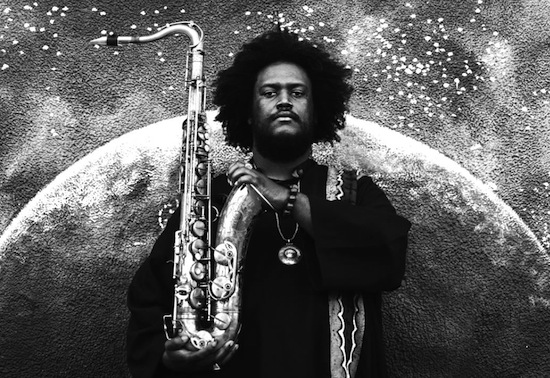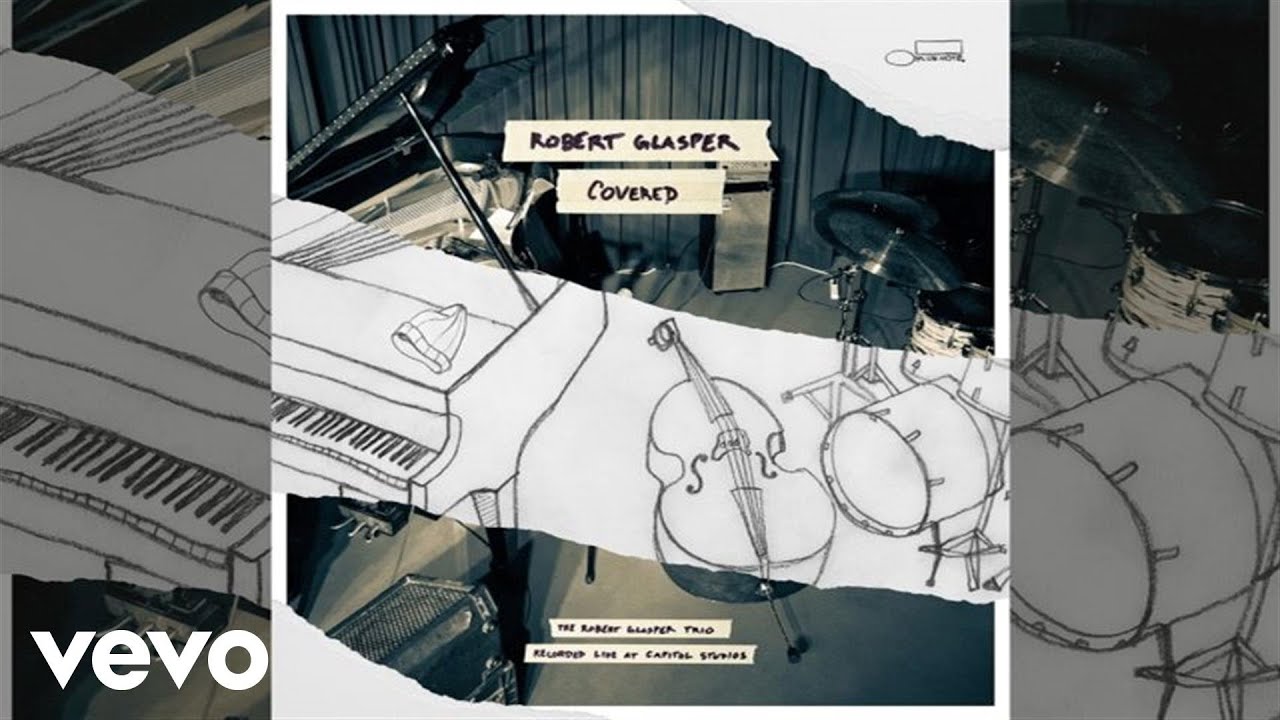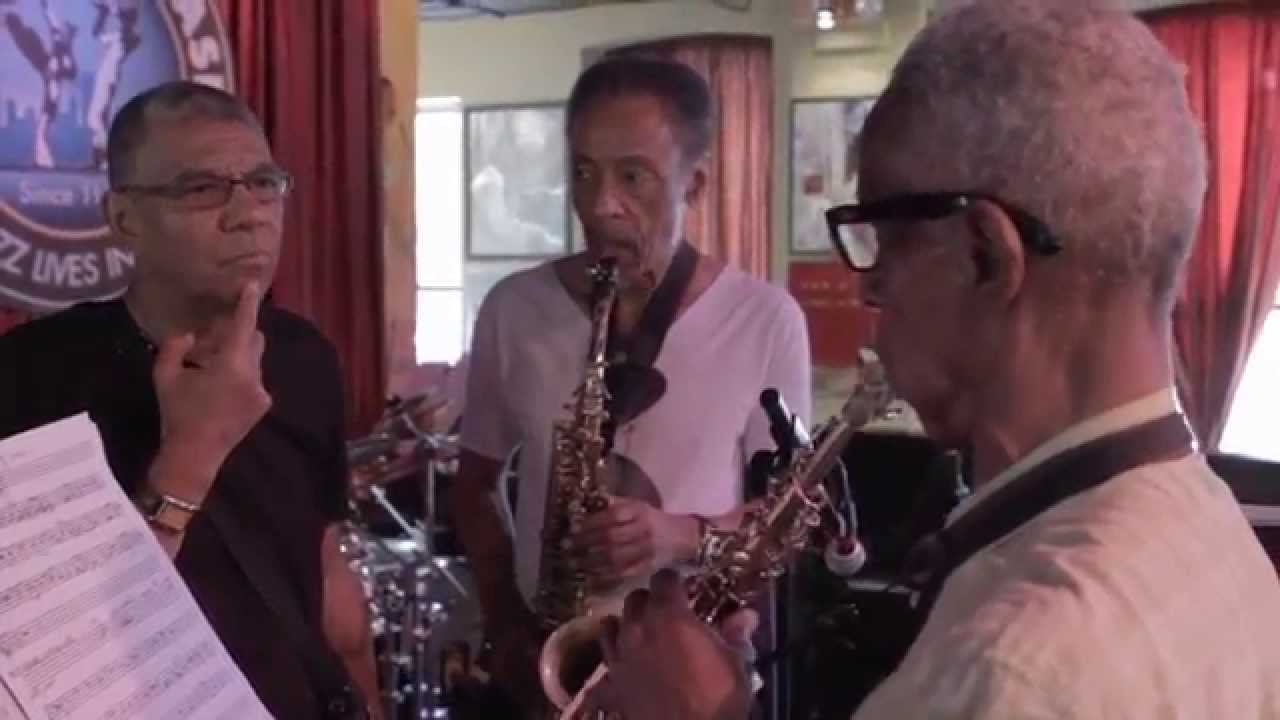Featuring contributions from Kamasi Washington, Robert Glasper, Thundercat and Ronald Bruner Jr, Kendrick Lamar’s To Pimp A Butterfly has perhaps done more than any recent pop album to bring contemporary jazz musicians into the wider public consciousness. Washington and Glasper both feature in this month’s Complete Communion, alongside the more outré likes of Alex Ward and Cactus Truck. Brilliant new albums from Jack DeJohnette and Steve Coleman testify to the health of American creative music, while the young British keyboardist Kit Downes steps aside from his post-jazz outfit Troyka to explore the elegant chamber music of Tricko.
Kamasi Washington – The Epic
(Brainfeeder)
Arriving on the back of his contributions to Kendrick Lamar’s To Pimp A Butterfly and Flying Lotus’s You’re Dead!, Kamasi Washington’s The Epic is aptly named. Weighing in at almost three hours, the Los Angeles saxophonist’s triple album has few obvious traces of hip-hop or electronica, but it shares Lamar’s radical black consciousness and FlyLo’s musical ambition. Spanning hard bop and spiritual jazz, R&B and fusion, The Epic is a powerfully contemporary engagement with the African-American tradition.
Opening track ‘Change Of The Guard’ is a bold statement of intent, its memorable main theme recalling the Afro-centric modal jazz of McCoy Tyner circa Enlightenment and Sahara. Buffeted by celestial choirs and airy strings, Washington and his band tear through energetic hard bop solos and funky organ interludes, pulling it all together in repeated statements of that rousing chorus. As the twelve-minute piece reaches its climax, Washington lets rip with a raspy overblown solo, channelling the Pharaoh Sanders of Karma and Black Unity.
Other highlights of disc one include ‘Final Thought’ where a gospel organ intro gives way to a hot funk joint reminiscent of Gary Bartz’s NTU, and ‘Askim’ which starts out as a reflective ballad before simmering over into febrile hard bop. ‘The Rhythm Changes’ is the first of the album’s three R&B tunes featuring the vocals of Patrice Quinn. Recalling Stevie Wonder’s ‘He’s Misstra Know It All’, it’s a lush slice of 70s soul, gently grooving on the Latin inflections of Cameron Graves’ piano. Its changes are revisited on the second disc’s instrumental ‘Leroy & Lanisha’, a showcase for the delicious trumpet and trombone interplay of Igmar Thomas and Ryan Porter.
Disc two opens with another spiritual jazz epic, ‘Miss Understanding’. Piano, choir and African percussion rise en masse in a free form communion, before the core band steps up for a fast hard bop excursion, all walking bass and flashes of trumpet. ‘Re Run’ and its disc three reprise, ‘Re Run Home’ fuse the modal melodies of classic Ethio-jazz with the humid funk of On The Corner era Miles, while ‘The Magnificent 7’ is an ice-cool slab of spy-thriller funk, topped off with a lubricious solo from bass wizard Thundercat.
The final disc has the perhaps widest scope of the three, ranging from the sweet sun-kissed soul of ‘Cherokee’ to a gorgeous Deep Soul interpretation of ‘Clair De Lune’ that transplants Debussy to Muscle Shoals. Its centrepiece is a version of Terence Blanchard’s ‘Malcolm’s Theme, where the vocalists give voice to a Malcolm X speech, before taking the piece straight to the pulpit in an ecstatic display of whooping, hollering and gospel testifying. ‘The Message’ closes the album on a virtuoso flourish, with intense soloing from Thundercat, drummer Ronald Bruner Jr and Washington himself over a hybrid hard bop/funk structure.
Not everything on this vast, sprawling album works – I’m agnostic about the strings and choirs – but there’s no doubting Washington’s talent or vision. The Epic might not be formally radical, but its ambition and emotional generosity are a joy to behold.
Robert Glasper – Covered
(Blue Note)
Another To Pimp A Butterfly alumnus, Robert Glasper is best known for his jazz/neo-soul/hip-hop crossover albums Black Radio 1 & 2. While those projects had their moments, not least the first volume’s Mos Def starring title track, they were a little too slick for my tastes. As a follow up, Covered is relatively low-key and all the better for it. Taped live in the studio, Covered gives Glasper and his rhythm section the space to stretch out on a well-chosen set of tunes. A revisiting of Black Radio 2‘s ‘I Don’t Even Care’ replaces the original’s loping hip-hop groove with Damion Reid’s live breakbeat alchemy, taking us into Roni Size territory. Glasper responds with a quote from The Roots’ ‘You Got Me’, underlining the drum & bass to hip-hop connection. Contemporary jazz takes on Radiohead have yielded mixed results, but the trio’s take on ‘Reckoner’ is surprisingly effective, with Reid making subtle subdivisions of Philip Selway’s drum part while Glasper opens out the melody. It might lack something of the original’s bleak urgency, but it takes the song’s base materials somewhere interesting. Glasper is smart enough to avoid gimmicks and choose tunes that lend themselves to improvisation, but the undoubted highlight of the album is the sole original, ‘In Case You Forgot’. Over a creeping right-hand figure, Glasper shapes deliberately narrow tone clusters into weird staccato phrases. His neo-soul I can take or leave, but I’d love to hear Glasper do more of these knotty abstractions.
Steve Coleman – Synovial Joints
(Pi Recordings)
One of contemporary jazz’s deepest thinkers, Steve Coleman is renowned for his research into ancient and non-Western musical systems, applying his findings to his own methods of spontaneous composition and collective improvisation. Two years in the making, Synovial Joints explores two compositional ideas: "musical movement employing connective principles" and a concept he calls "camouflage orchestration", inspired by fielding recordings he made in the Amazonian rainforest. In the former case, Coleman has attempted to convey the movements of the synovial joints in musical form. The principle of camouflage orchestration, meanwhile, sees him play with the distribution of instrumental sounds, phasing them in and out of the foreground and background.
All this might sound mind-bogglingly cerebral, but for all its seriousness of intent Synovial Joints conveys a playful complexity, its bright melodies and inventive arrangements reflecting Coleman’s curiosity and delight in human physiology. The central ‘Synovial Joints (suite)’ begins with ‘Hand and Wrist’, as horns, strings and trilling flutes flex around a single-note piano jab. Three minutes in, pizzicato strings and violin glissandi usher in a change in rhythm and texture, as the piano falls away, returning fleetingly with deftly timed impressionistic clusters around Coleman’s inquisitive alto sax. ‘Hip And Shoulder’ gives drummer Marcus Gilmore some, his rolling tom hits and bass accents adding some ballast and drive, before setting up a Tortoise inflected conversation between piano and guitar. Coleman’s singular rhythmic sensibility brings a jazzy swing to the cubist angles of modern composition. The introduction of Afro-Cuban and Afro-Brazilian percussionists on ‘Harmattan’ and ‘Nomadic’ is inspired, their polyrhythmic fluidity bringing some loose warp and weft to Coleman’s jagged modernist structures. This is a remarkable album, a joyous workout for the mind and body alike.
While we’re talking Coleman, it’s worth noting that he’s recently made several of his earlier recordings are available for free download and stream here.
Jack DeJohnette – Made In Chicago
(ECM)
ECM’s output can be rather too tasteful these days, but their AACM releases are consistently excellent. Jack DeJohnette is of course a mainstay of the label, both as a leader and a sideman. After all those bland Keith Jarrett standards recordings, it’s a joy to hear the great drummer reconnecting with his avant-garde Chicago roots. Made In Chicago marks the 50th anniversary of the Association For The Advancement of Creative Musicians, reuniting him with Windy City luminaries Roscoe Mitchell, Muhal Richard Abrams, Henry Threadgill and Larry Gray. It’s a wonderful testament to the AACM’s generous approach to composition and improvisation, deftly synthesising the jazz tradition with classical music and the modernist avant-garde.
The set opens with the rippling piano and alto refrain of Mitchell’s ‘Chant’, its looping scalar phrasing recalling the minimalism of Phillip Glass or Terry Riley. Mitchell’s soprano saxophone dominates, his cycling trills coming in and out of phase with the other musicians. Notes spool out of his horn, piling up on top of each other to create ghost tones and gritty harmonics. As his epic solo comes to an end, Threadgill’s graceful alto enters to restate the theme and round off the piece.
Abrams’ ‘Jack 5’ is more pensive and impressionistic, the pianist sketching out a finely balanced canvas of blue and purple tones. Mitchell’s ‘This’ has its composer on baroque flute and Threadgill on bass flute, sounding stark Stravinskian melodies against Gray’s arco bass counterpoint. DeJohnette is a subtle presence, adding tom rolls as Abrams investigates whole tones and partials at the top of his keyboard.
DeJohnette’s ‘Museum Of Time’ runs straight into Threadgill’s ‘Leave Don’t Go Away’, the former’s gospel tinged chords setting up the Latin American harmonies and syncopations of the latter. Over the rhythm section’s supple, easy groove, Mitchell delivers a remarkable solo on soprano sax, his pinched snake-charmer tone given subtle support from Threadgill’s bass flute. A closing free improvisation gives the players an opportunity to take it out, with DeJohnette summoning quiet thunder over Lake Michigan as the reedists flit and swoop. The level of collective improvisation is just incredible: Mitchell and Threadgill’s sensitivity to space and tonality is astonishing, as they move between esoteric reeds and harmonic systems. The 84-year-old Abrams’ playing is full of grace and wonder, while DeJohnette and Gray are a model of an interdependent rhythm playing. An outstanding recording: let’s hope these masters reconvene soon.
Cactus Truck – Seizures Palace
(Not Two)
Just when you were wondering what happened to the skronk, along come Dutch-American trio Cactus Truck with a bahookie-blasting pound o’ sound. Alongside Quietus favourites Dead Neanderthals, Cactus Truck lead the New Wave of Dutch Heavy jazz, their sound oriented more towards punk and no-wave than the former’s metal and noise attack. In John Dikeman the group has a superb saxophonist who has kept company with William Parker, Joe McPhee and Jeb Bishop. Rather than go for the vibrato-heavy blast of a Peter Brötzmann or a Mats Gustafsson, Dikeman favours a clearer tone, building intensity through hard, bluesy runs before unleashing the raging multiphonics. That approach can be heard on high-energy opener ‘Will To Power’, as Dikeman blows over the bloody barbed-wire tones of Jasper Stadhouder’s bass and Onno Govaert’s sprawling drums. ‘Drones’ takes a slightly different approach, with Dikeman’s squeaking alto scything through Stadhouder’s furious guitar scrabble. ‘Difference and Repetition’ is extra-heavy, with Govaert’s relentless double kick drum action bringing on Armageddon, while ‘Fuck You Nash’ captures the drummer in a jazzier mode, hammering out deconstructed tattoos to the metallic twangle and hiss of Stadhouder’s no-wave slide guitar. More information here.
Alex Ward Quintet – Glass Shelves And Floor
(Copepod Records)
Alex Ward is only 41, but he’s been a stalwart of British free improvisation for decades, having begun playing with the great Derek Bailey at the age of 12. Glass Shelves And Floor is one of two new releases on Copepod, the label he co-runs with Luke Barlow (the other is Deadly Orgone Radition, a gonzoid avant-rock trio with James Sedwards and Weasel Walter). Composed and performed in the summer of 2013 at the Café Oto Project Space, ‘Glass Shelves and Floor’ sees Ward explore a range of aleatoric strategies, from full and semi-notated passages to improvisation based on designated pitch sets and verbal descriptions. In addition, he leaves spaces for open improvisation, both collective and solo. As Ward writes in the sleeve notes, it is not essential to grasp the technical aspects of the composition in order to ‘understand’ it. The point of his method was to give the piece a distinct character, one which reflects the musicians’ individual playing styles. The CD features live and studio versions of the piece, demonstrating the different directions in which the piece can be taken, while retaining its essential character. This is a highly complex music, teeming with detail, yet despite its 12-tone modality and prickly textures, it never seems austere or forbidding. There’s a playfulness and fluidity to the group playing, with Ward and Tom Jackson’s clarinets enjoying fluttering dialogues, and cellist Hannah Marshall and double bassist Olie Brice weaving knotty thickets of choppy bow work and plucked strings. The live take is, perhaps inevitably, a little rawer, with a toothsome cello snaps and groaning arco bass, and shrieking feedback from Ward’s amplifier. Rachel Musson has a striking solo feature, her tenor sax throwing out yelps and squawks between lyrical phrases. There are some lovely, reflective passages, not least the section dominated by clarinet and double bass, where the players ease into a jazzier mode. A terrific album, imbuing the formal rigour of systems music with the expressiveness and spontaneity of free improvisation.
Kit Downes – Tricko
(Coup Perdu)
Tricko:
Trickotareco from Ashley Pegg on Vimeo.
Tricko, Kit Downes’ duo with cellist Lucy Railton, is a very different prospect to his mathy electronic jazz trio Troyka, but it does share that group’s penchant for games with structure and time. As Downes explains in his sleeve-notes, his compositional approach was influenced by the different ways in which we perceive time and scale, and how music can seem to alter a person’s internal clock. There’s certainly a clockwork dynamism to some of the pieces, not least ‘Arkane’, with its strident staccato rhythms and tricksy subdivisions of the beat, and the perky minimalist figures of ‘Tricko’. Elsewhere, Downes and Railton explore less mechanical approaches to time, playing over a field recording of running water in ‘Waira’ and drifting out into space on long trails of cello reverb in ‘Inho’. This album is closer to contemporary classical than jazz, with a generous harmonic language that incorporates dissonance into its silvery neo-classical textures. But there’s a jazz sensibility in its sensitivity to time and space, with the players making in-the-moment decisions that make this elegant chamber music live and breathe.






